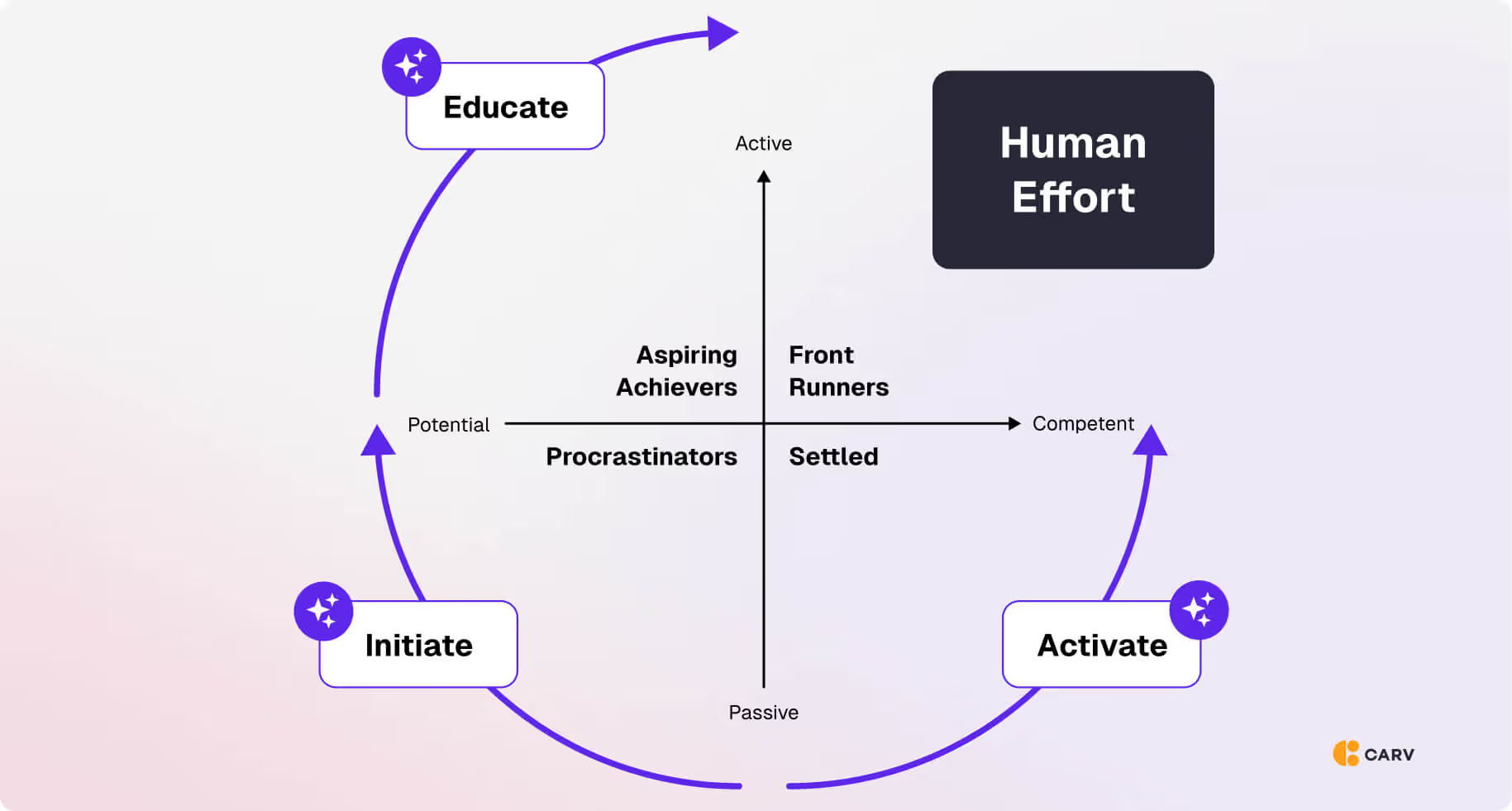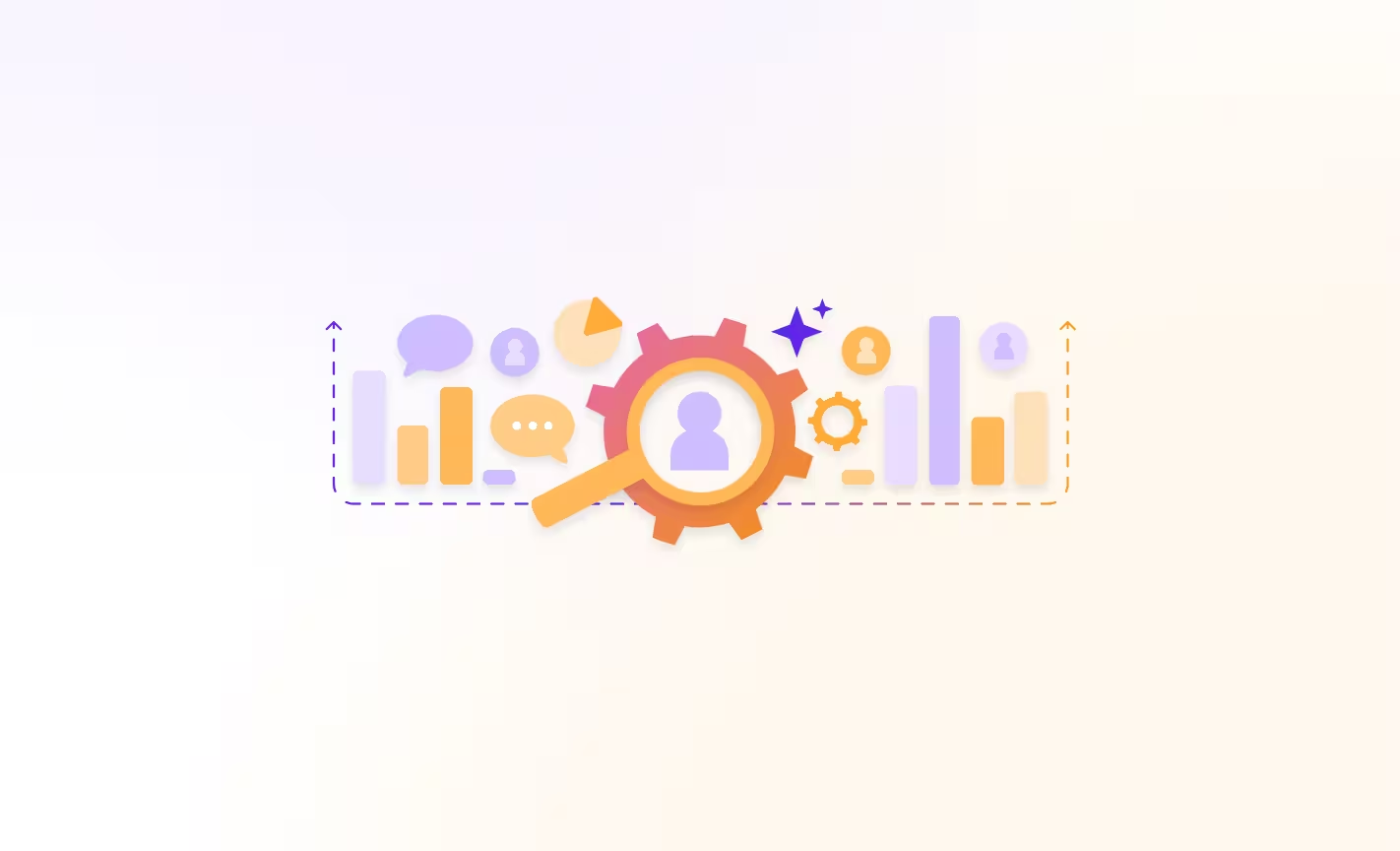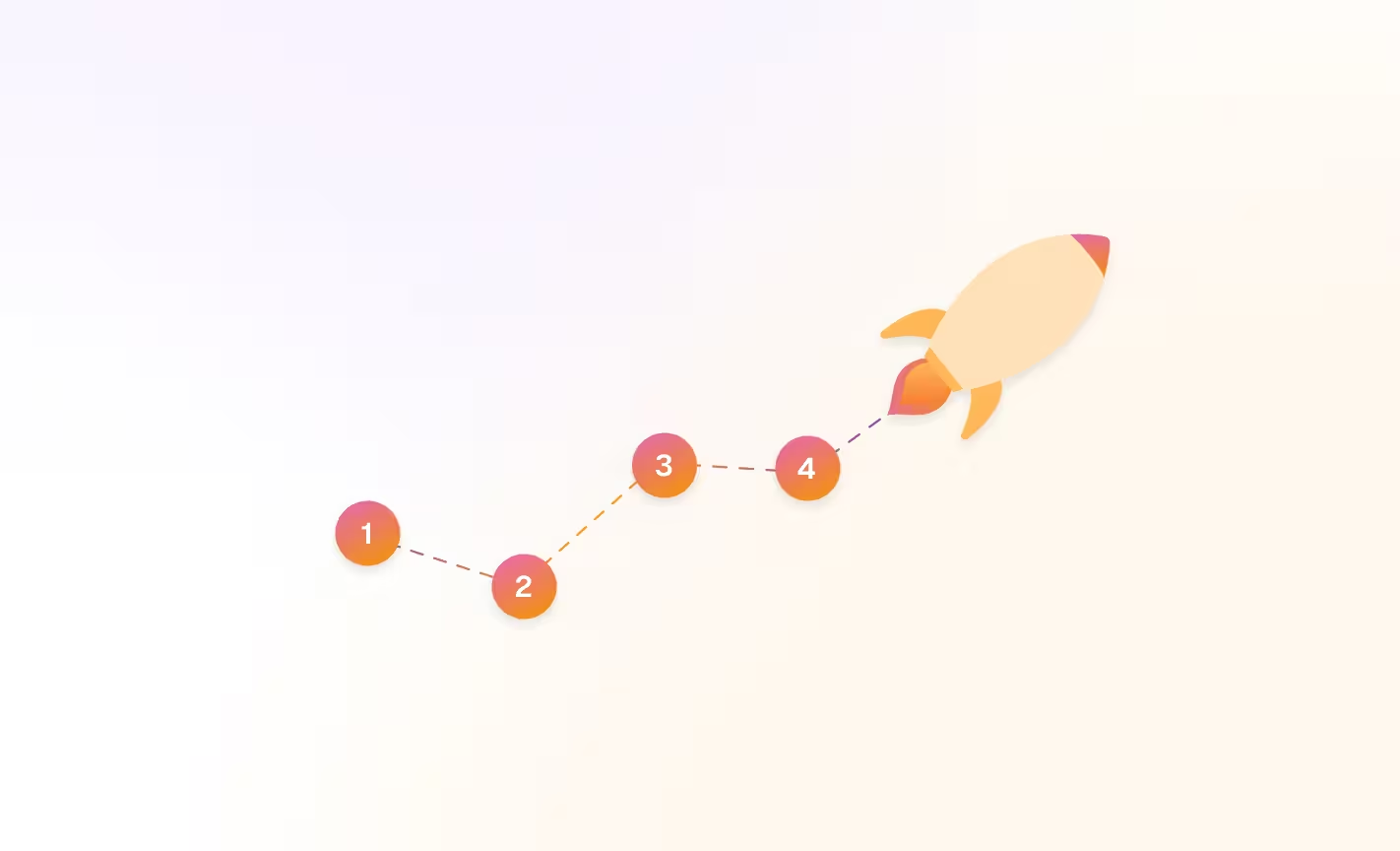For agency recruiters, time is money. Filling positions quickly translates to more clients served, happy bosses, and a healthy bottom line.
But there's a catch: speed shouldn't come at the expense of quality.
A constant stream of less-than-ideal placements and poor retention rates can damage client relationships and ultimately hurt the agency's reputation.
On the surface, the solution seems straightforward: prioritize automation and streamline processes for speed, then dedicate the saved time to in-depth sourcing and screening, to make sure you only get high-quality candidates in.
However, the reality paints a different picture.
Even with automation tools, agency recruiters still find themselves bogged down in administrative tasks, consuming a staggering 30% of their workday. At the same time, finding the right candidates for open roles remains a persistent challenge.
So, what's the missing piece?
In this article, we'll look at the obstacles preventing agency recruiters from achieving this balance, and how AI can help bridge the gap between process speed and quality of hire.
The ever-present challenge: Speed vs. quality of hire
The constant struggle of balancing speed with quality in agency recruitment stems from two key limitations of traditional methods.
The bottleneck of unstructured data
Many time-consuming administrative tasks, like candidate write-ups or intake call debriefs, rely on unstructured data - emails, phone conversations, and notes.
Regular automation tools struggle to handle this format, leaving recruiters bogged down in manual processes.

For instance, an automation tool can move a candidate through stages, but can't analyze interview notes to create a personalized candidate profile for a client.
Similarly, regular automation technology can’t write meeting debriefs and follow-up emails, and can’t prepare interview questions for a next round. So all these prep and follow-up actions need to be done by recruiters manually.
Underutilized candidate intelligence
When it comes to quality of hire, although recruiters gather a wealth of information during candidate interactions, they often lack the infrastructure to effectively store and analyze it for later use.
This valuable "candidate intelligence" collected during screening calls, CV scans, or phone interviews gets lost in generic applicant tracking systems or talent pools lacking the ability to capture rich details and context.
Imagine a perfect candidate for a future role being lost in the system because the ATS notes don't capture the full picture, and the recruiter didn’t write down all the information the candidate shared during a virtual or in-person interview.
This inability to effectively match candidates across different opportunities and route them between clients based on job fit leads to missed opportunities for both recruiters and job seekers.
Both these challenges can be solved with AI, in a way that benefits all parties involved: recruiters, candidates, and clients.
But before we delve into the specific applications of AI, let's briefly explore the consequences of prioritizing one aspect over the other.
Consequences of prioritizing one over the other
While meeting deadlines is important, sacrificing quality for speed can have severe consequences for both your agency and your clients.
- Burning through cash: Rushing to fill a vacancy leads to poor candidate selection, resulting in higher turnover and the need to repeat the entire hiring process. This translates to wasted time, resources spent on onboarding and training, and potential severance packages.
- Client churn: Delivering bad hires directly impacts client satisfaction. Clients expect qualified candidates who can make a positive contribution, and consistent misses erode trust and lead to client churn.
- Damaged employer brand: News of a string of bad hires travels fast within the industry. A reputation for hasty hiring decisions deters top talent from applying, shrinking your pool of qualified candidates in the future.
Thus, while speed is a factor, sacrificing quality for a faster time to fill ultimately leads to a negative ROI and undermines your agency's reputation.
The opposite is true also: While a thorough recruitment process is essential, getting stuck in an overly cautious loop can have its own set of drawbacks.
- Losing out on top talent: With talent shortages at an all-time high, a lengthy and overly cautious hiring process can leave you at a disadvantage. The best candidates often have multiple offers, and a slow decision could mean losing them to a more agile competitor.
- Frustration and disengagement: A drawn-out recruitment experience can frustrate both candidates and clients. Candidates may lose interest and withdraw their application, while clients might feel their needs are not being prioritized. This can damage your reputation as a recruitment agency and make it harder to attract both high-caliber candidates and future clients.
- Missed opportunities: While caution is important, excessive deliberation during decision-making can lead to missed opportunities. The market can shift quickly, and a delay in filling a critical role could hinder your client's ability to capitalize on emerging trends or market shifts.
Striking the right balance between caution and speed is crucial. By implementing efficient strategies and leveraging the right tools, you can streamline the recruitment process without sacrificing quality.
Rethinking agency recruitment operations with AI
This is where AI steps in, offering a transformative solution that benefits all parties involved: recruiters, clients, and ultimately, the candidates themselves.
Although the applications of AI in staffing and recruitment are numerous, if we take a broader view, we can say that artificial intelligence is re-shaping agency recruitment operations in two main ways:
- AI-powered automation tools can handle unstructured data, streamlining tasks like interview scheduling, summarizing calls, and generating candidate profiles. This increases the efficiency of the core recruitment process and frees up valuable recruiter time for crucial strategic activities.
- AI-driven talent pools can store and analyze detailed candidate information, including interview notes and skills assessments. This allows recruiters to leverage their entire talent pool and identify the perfect fit for every role, even if it's not an immediate opening.
Let’s dive a bit deeper into these two aspects, using Carv’s AI as example.
Note: Carv is AI purpose-built for staffing agencies and in-house recruiters. However, some of the principles mentioned here will apply to other gen AI tools too.
AI-powered automation for core process efficiency
Most of a recruiter’s time should be spent on tasks associated with the core hiring process. Think of steps like sourcing, screening, or interviewing candidates.
However, in between these steps, there’s a lot of small admin tasks that need to be done, and that end up taking 2-3 hours per day, every day.
Things like summarizing a call with a candidate for the hiring manager, debriefing an intake call to write a job description, or preparing questions for the next interview with a candidate: All these tasks can be automated with AI to increase the efficiency of the core recruitment process.
Given that AI can handle unstructured data, it can both understand and create human-like content. Carv’s AI, for example, can work with anything from written notes to recordings of phone screening calls or video interviews.
All this unstructured data can be processed by AI assistants and turned into structured data for the next steps of the talent acquisition process.

For example, an AI workmate can join a recruiter’s screening phone call, register what is said, then summarize the meeting in a few notes and create a short overview of the candidate. It can also automatically populate the ATS with the needed information.
This reduces the time spent on admin related to screening process from a few hours to a few seconds.
Next, AI can automatically send meeting notes and candidate write-ups to the recruiter’s or hiring manager’s inbox, automating this part of the process. And this approach can be applied to virtually any stage of the recruitment cycle where unstructured data is used, as described below.
%2520(1).avif)
- During the intake step, AI can listen to the call with the client, register what is said, and turn those meeting notes into an extensive job description ready to be distributed on job boards or in social media. Gen AI can work with clear instructions and structure the job requirements in a specific way, while maintaining the desired tone of voice.
- Next, AI can source candidates either from a talent pool or via social media platforms like LinkedIn. AI has infinite work power and processing capacity, so it can browse through candidate profiles 24/7, matching potential candidates with open positions based on skills and competencies, location, experience, and so on.
- During candidate screening, AI can take over all the admin, checking a candidate’s resume, social media profile, and screening call, and putting together all this information into one comprehensive candidate profile.

- AI can also take over the interview scheduling and the communication with candidates and clients. For example, an AI agent can reach out to passive candidates through direct messaging via WhatsApp to see if they’d be open to discussing a job opportunity.
- Another AI agent can inform recruiters through email that a new candidate matches one of their role and is ready to schedule an interview, and so on.
- Once the interviewing process is done, artificial intelligence can assist recruiters in creating candidate write-ups for clients and shortlisting candidates. AI can generate comprehensive rankings based on a weighted combination of factors like skills assessment results, interview performance, and cultural fit indicators.
- Finally, an AI recruiter assistant can draft job offer letters and contracts, as well as support a human counterpart in onboarding new hires.
As you can see, the only step in this core recruitment process where an agency recruiter’s live intervention is actually needed is the interview.
All the other steps and tasks can be delegated to AI, significantly reducing admin, increasing a recruiter’s effectiveness, and reducing the average time to hire.
%2520(1).avif)
AI-driven talent pools to increase quality of hire
Beyond optimizing efficiency, AI can help agency recruiters build better talent pools, ultimately leading to higher quality hires. Here's how.
Comprehensive candidate profile
Traditionally, candidate profiles are often limited to information gleaned from resumes and screening calls, stored in the ATS.
However, AI can create comprehensive candidate profiles that go far beyond the basics.
AI can integrate data from various sources, including skills assessments, interview notes, past interactions, and social media profiles. This paints a more complete picture of a candidate's skills, experience, and cultural fit.
AI-powered profiles are objective and data-driven, mitigating the risk of unconscious bias that can creep into the traditional recruitment process. This ensures all candidates are evaluated based on their qualifications, not demographics or background.
Matching beyond resumes
Traditional search methods often rely heavily on keywords and resumes. AI, however, can analyze a wider range of data points, including skills assessments and interview notes, to find the best candidate for an open position.
This allows for a more holistic understanding of a candidate's capabilities and cultural fit, leading to better matches and reduced chances of hiring misfires.
But it doesn’t end here. AI can also understand timelines and preferences, and can identify candidates who’d be open to relocating, for example, and would fit a specific vacancy.

AI can identify passive candidates who possess the specific skills and experience required for a role, even if they haven't actively applied. This allows for targeted outreach to a wider pool of qualified talent, increasing the chances of finding the perfect fit.
Finally, AI talent pools are constantly learning and evolving. As more data is added and analyzed, the system becomes better at identifying patterns and predicting successful placements. This allows for continuous improvement in the quality of hire over time.
Over to you
To sum it up, the constant struggle between speed and quality in agency recruitment can be a major headache. But with AI, there's a way to achieve both.
AI can handle the time-consuming tasks, from intake- and interview-related admin to building comprehensive talent pools, freeing up recruiters for strategic activities. Faster time to fill with top talent leads to increased client satisfaction and retention.
This future-focused approach positions agencies to not only thrive in today's competitive landscape, but also build a reputation for quality placements that attracts top talent and drives long-term success.
If you’re looking to improve the effectiveness of your core recruitment process, or you’re curious to see how Carv can support you in building an intelligent, AI-driven talent pool, you can book a demo below.
.avif)


.avif)




